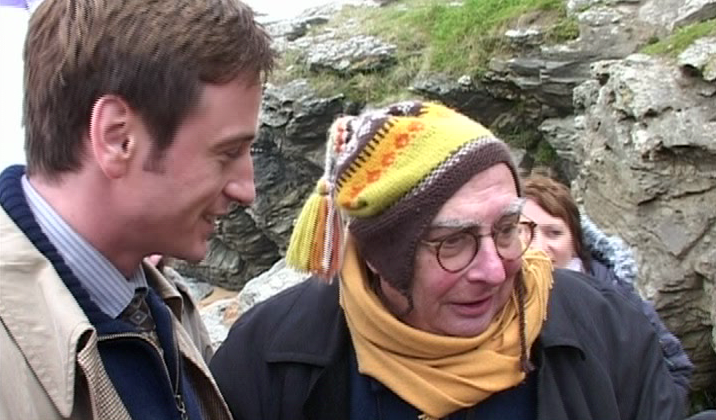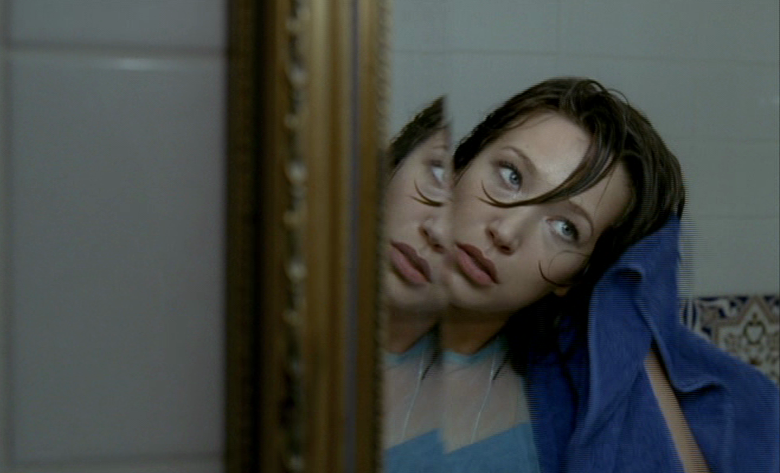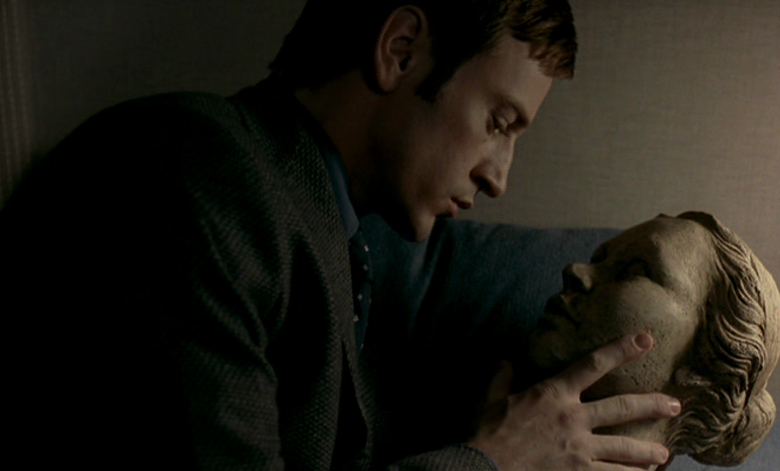
MOVIE SHELF: COMPARING FILMS TO THEIR LITERARY COUNTERPARTS
christopher funderburg
CLAUDE CHABROL'S THE BRIDESMAID

based on THE BRIDESMAID by RUTH RENDELL
page 3
But by what right does Chabrol transform this story? Rendell's a popular author, I'm sure she has a few fans who are totally infuriated by what I've written thus far, some folks likely vehemently disagree with my perspective and what Chabrol has done to The Bridesmaid. Why should Chabrol select this book only to utterly undo it? Why, in a larger context, do authors do this sort of thing all this time? Let's look back at the other Movie Shelf entries: as much as the films have altered their sources, is there anything exactly like what Chabrol has done here? The Spy Who Loved Me 100% ignores the ludicrous original text, substituting out the story of Sluggsy and Horror in an upstate New York motel for skiing shoot-outs, monstrous metal-mouthed henchmen and a showdown on a nuclear submarine. Chabrol doesn't ignore the plot of The Bridesmaid, it's still about a young couple exchanging murders, a young interior designer who falls in bed with a sultry mystic he meets at his sister's wedding. Maybe Godard's Made in U.S.A. is a little closer to what we're talking about - a French New Waver playing fast and loose with a pulp crime tale. Only Godard's film has nary a single superior element to the book and, in fact, the film plays much more coherently if you are familiar with Richard Stark's The Jugger - you can actually follow the plot of the film if you're read the book, which is a tough feat otherwise. The plot mechanics are weirdly in sync in both versions - not so with the two Bridesmaids. And - is this an important wrinkle? - fans of Donald Westlake/Richard Stark hate that film with the fiery passion of a thousand suns, while Rendell fans don't seem to feel strongly about Chabrol's adaptation. Peter Yates' The Friends of Eddie Coyle reproduces big swaths of the novel almost exactly as it is written and can only really be accused of making the proceedings a touch sexier and more exciting - it's one of the more faithful adaptations in existence. The Grifters might even be more faithful to the Jim Thompson novel, to a point that it starts to produce weird results and warp the reality of the film upon the introduction of a single invented sequence. Now, Wim Wenders' The American Friend, a take on one of Patricia Highsmith's Ripley novels, has an approach that seems to have a lot in common with Chabrol's methods: almost all of the surface details are changed, characterizations are altered; names, locations, hairstyles all jettisoned and replaced with wild variations. But Wenders' film has an essential fidelity to Highsmith's themes, her ideas about a man like Tom Ripley and his soul-sick mark. It changes everything about the book but remains in the running for the most "correct" Highsmith adaptation ever produced.
So even by the notorious standard for liberties taken in film adaptations, Chabrol did something fairly strange. So why? Why pull apart this book to make this film? And, as much as I prefer the film, is this really something that I should condone? Ah, who am I kidding, I'm no moralist. That conversation of "rightness" is for someone who believes in anything, anything at all. To me, the end result of a great movie more than justifies the wanton trampling of a book. But isn't it nonetheless a weird thing to do? I mean, what would have prevented him from making a Rendell/Bridesmaid pastiche as he had done with Simenon and Inspector Bellamy? He has already changed enough that with only a little more effort he could have erased any connection to the novel. Well (to answer my own seemingly rhetorical question) I think that Flora, the physical object, the totem, appealed to him so much that he wanted to tell the story of Flora in some funny way - and she's the book's defining figure. If it weren't for Flora, it would be tough to connect Charbrol's film to Rendell's book. A single image has driven many filmmakers to create entire films, from Catherine Denueve's mud-splattered back in Belle de Jour to the tethtered balloon-man fantasy of 8 1/2, so I can imagine the film's most indelible image, that of Phillip hopping the fence to snatch Flora away from her new home, possessed Chabrol to bother with a book he clearly doesn't care for. Sure, Rendell's a successful author and that probably played a part in getting financing for the film; those mundane business-world realities are always a bigger part of an artwork's creation than the myth-making lets on, but so what? He could have made A Sight for Sore Eyes then for all we know.* I think that Chabrol's treatment of Flora shows that I'm right - she spends most of the book stuffed in a closet and functions as a plot device. Chabrol's Flora spends a lot of time in Phillip's loving embrace, her hard features stroked gently, obsessively by our hero. Other times, she watches him silently from his desk as he dithers with paperwork or stares out the window. She's a real presence, a silent stone Greek chorus in Chabrol's movie and her physical presence, her imposing beauty, her very nature adds a strange layer to the film, or at least gives us a window into Phillip's strange mind. And Phillip's strange mind is, as evidenced by the totality of his oeuvre, very much of interest to Chabrol.

We're not going to entirely lose the thread of Flora-the-totem driving Chabrol's film, but while we're on the subject of Phillip's strange mind, let's talk about how acting warps material in the process of adaptation. I was getting ready to call this "an over-looked way in which source material gets warped" but I guess that everybody and their brother's wife's boss thinks about casting, about whether Javier Bardem is really the correct choice to play Holden Caufield or what-have-you. That's how folks do. But beyond whether Benoit Magimel is the correct choice to play a 22-year-old blue collar Paul McCartney look-alike or not, what Magimel does with the performance matters even more. Let's make a distinction here between the casting ("Owen Wilson as Troy Loudon - yaaaay!") and the performance ("And he's decided to play the role as an inbred Southern hick with an impenetrable Tuscaloosa drawl - noooo!") It's tough to judge the casting of Magimel not only because of the change of setting, but because Rendell hasn't etched much of a character. In the book, he's Phillip Wardman: Some Guy. Again, Rendell's lack of moral/authorial perspective can probably be blamed as the culprit here in that she hasn't bothered to give her main character any concrete characteristics aside from some vague, deeply felt aversion to violence. Even then, despite Rendell's intermittent, tossed-off assertions to the contrary, Phillip's distaste for violence doesn't seem to exceed any normal human's aversion to violence or even really come into play in the plot. Nevertheless, it's the only bit of info that defines him beyond "some guy...you know, just a regular dude...he had a job doing stuff...taking measurements of bathrooms and whatnot."** So putting Magimel in the role doesn't exactly disrupt Rendell's carefully crafted picture of a man who takes his dog for a walk and leaves phone messages for a young lady he's dating. But, oh man, does Magimel flesh out psychological dimensions not readily apparent from the book. Chabrol and Magimel collaborated on three of the auteur's last five films so it's probably no coincidence that Magimel steers the role precisely into Chabrol-ian archetype of "regular guy with a hidden depravity."
Magimel's performance, most especially when he holds and caresses and gazes upon Flora, describes a Phillip utterly at odds with the one farted out by Rendell. Phillip's first real direct action in the film is hopping the fence to steal the bust. Up until then, he's been overtly noncommittal, displaying a neutrality on the subject of Gerard, while being quizzed on his ex-girlfriend, on his sister's fiancé. He isn't interested in the news of Raphaelle Plissier's disappearance and doesn't want to comment strongly on anything around him. Cut to: Flora in her new garden home at night. Suddenly, Magimel darts fluidly into frame and hops the fence like a cat. He snatches up Flora and steals her away with a manner of placidity over him. That's the first real thing Magimel's Phillip does. And it is weird. The scene is shot and staged and performed amazingly - not the sweaty bumbler of Rendell's book driven by anger of his mother's romance. In the book, Flora was a gift given to his mother by his dead father - that Arnheim shits on it makes his blood boil. In the film, Phillip's dad was a deadbeat he never knew, the statue wasn't a gift and before the theft, he expresses casual indifference to it. When he hops the fence, we can see plain as day: Phillip is a weirdo. A charming weirdo who steals sculptures and enters into metaphysical reveries with his cosmic mirror, Senta. There's something very funny about Magimel in the role - he's never creepy, even when stroking Flora in his bed or discussing murder. In fact, he takes the scene where Senta proposes the murders and plays it for comedy. Magimel injects humor into a scene written by Rendell with severity under ominous pall - it becomes the funniest scene in the film by virtue of Magimel's excitable, reluctant, disbelieving reaction. He thinks she's crazy, but is unwilling to say so and paints himself into a corner by vacillating between being intrigued and too much of a wimp to even consider her suggestion or take control of the rapidly escalating situation. Combined with his weird solitary interactions with Flora, we don't know Magimel's Phillip is capable of, only that he's got hidden depths.
Flora and Phillip, Phillip and Flora - I can see why Chabrol made this film from this book. I don't think it is that open of a question, even if you can't precisely say for certain. His choice of adaptation and in adaptation reflect him. At the end of the day and a very long article, Chabrol adapting The Bridesmaid reminds me of Phillip Tardeau hopping that fence to snatch up Flora: even if I'm not exactly sure why he did it, I'm with it. It's funny, creepy, mysterious and weirdly emotional. A late masterpiece from the Nouvelle Vague's mild-mannered psychopath.***

* And I'm sure there's some Rendell/Chabrol expert out there who does know - but whatever knowledge they have doesn't actually undermine my point. Even if someone came to Chabrol and demanded at gunpoint that he adapt this book that he hates, Flora is still the element that has most expressively captured his imagination.
** These quotes are taken verbatim from my upcoming sequel, The Best Man, in which Phillip narrowly avoids a prison sentence by selling Senta out to the cops and then, looking to get a fresh start, moves to some place to do whatever. The big change-up in my story is that his other sister gets addicted to eating rotten eggs as a way of connecting with the memory of their now-dead mother. Before my story begins, the mother dies of (and I believe this is the technical term) death by non-consensual buggery. The fatality maneuver is delivered by - you guessed - Gerard Arnheim! This time it's personal.
*** If anyone needs to blurb some Chabrol dvd's, I'm here. I'll even go to bat for the bad ones, just out of respect.
Related Articles
<<Previous Page 1 2 3 Next Page>>
home about contact us featured writings years in review film productions
All rights reserved The Pink Smoke © 2013